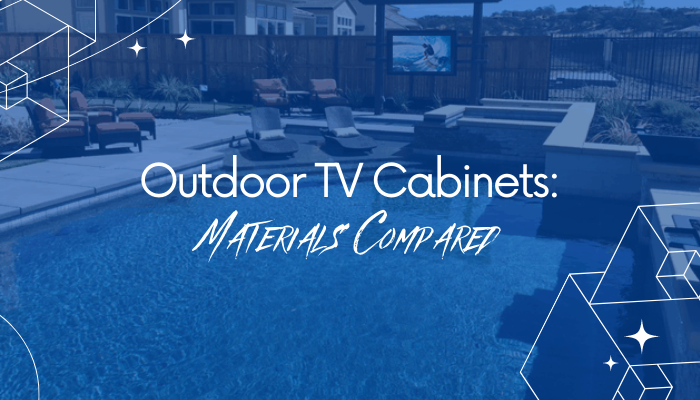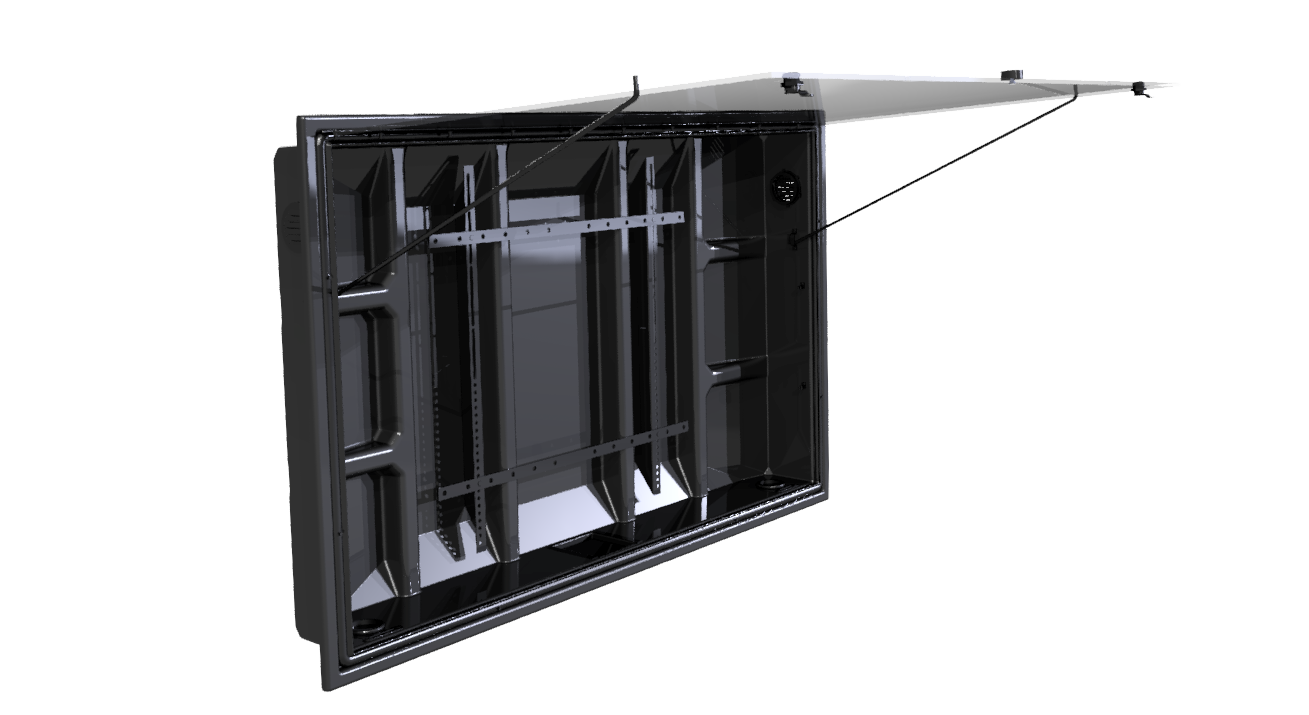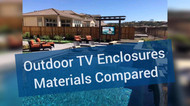Outdoor TV Enclosures: What Materials are Best?
3rd Oct 2022

Comparing Outdoor TV Enclosures by Material
When shopping for an outdoor TV enclosure, it is important to compare your options in terms of materials. The material of your enclosure will play a big role in how well it protects your TV from the elements and how long it will last. There are many different types of outdoor TV enclosures on the market, each with their own advantages and disadvantages. Outdoor TV enclosures need to protect your expensive equipment from impact and environmental damage, that’s why we make sure our outdoor TV enclosures are made with high quality materials. Outdoor TV cabinets must also be able to keep your electronics cool in any temperature conditions.
In this blog post, we will go through some of the most common materials used in outdoor TV enclosures: aluminum, PVC, stainless steel, polycarbonate and more.
Back Housing Outdoor TV Enclosure Material
Metal Outdoor TV Cabinet
One of the biggest advantages of a metal outdoor TV cabinet is the abundance of size options. Metal is typically the go-to choice for larger screens. It’s strong and durable, able to hold large, heavy TVs, and looks attractive in every space. Metal enclosures typically offer a sleek high-end look that other outdoor TV cases just don’t achieve.
However, given how robust they are, metal cabinets also tend to be heavier. You may need a little help installing yours, but rest assured that when it’s up, it’s going to stay there.
Polymer Cabinets
Outdoor polymer (robust outdoor plastic) is a less expensive option compared to metal enclosures. They’re lightweight and easily installed, plus they’re easy to clean and take care of. HMWPE is the best outdoor TV enclosure polymer to look for. It is the same material used for slides on playgrounds and has over 20-year durability ratings. It is sturdier than other outdoor plastics found in some digital display and TV cabinets. And the best manufacturers not only use HMWPE but also reinforce the outdoor TV cabinet with strategic ribbing (Protective Enclosures Company’s The TV Shield outdoor TV cabinets are an example).
In addition, if you live on the coast or you’re mounting a TV in a boat or cruise ship, polymer is your best option. Polymer is best for avoiding saltwater air corrosion that can damage TVs and metal display enclosures. Just because an outdoor TV box is advertised as being weatherproof polymer doesn’t mean all of it’s parts and pieces are truly ideal for handling moisture and saltwater air, so make sure you choose a cabinet that specifies it is safe for those applications or inquire with the seller. Your TV cabinet will stay looking and working like new under salty conditions while providing quality protection to the unit.

HMWPE (Best Outdoor Polymer)
HMWPE as an outdoor tv enclosure material HMWPE offers the best protection against UV light, moisture, and abrasion. It is also non-toxic, making it a safe material to use for outdoor tv enclosures. HMWPE is available in a variety of colors and can be customized to match your home’s exterior. Outdoor polymer (robust outdoor plastic) is more affordable compared to metal enclosures. These enclosures are lightweight and they’re easy to clean. HMWPE is the same material used for slides on playgrounds and has over 20-year durability ratings. It is extremely durable. And the best manufacturers not only use HMWPE but also reinforce the outdoor TV cabinet with strategic ribbing for ultimate strength (Protective Enclosures Company’s The TV Shield outdoor TV cabinets are an example).
Wood TV Cabinets
Wood TV cabinets look great when they’re new, but there’s a reason why manufacturers don’t use wood materials for weatherproof TV case production. Wood cabinets just don’t last as long when they’re outside.
Wood is susceptible to moisture damage, even when painted and finished. It won’t stay looking like new for long and could put your TV investment at risk.
Aluminum
Aluminum is a popular choice for outdoor TV enclosures because it is lightweight and durable. Aluminum is also resistant to rust and corrosion, making it a good choice for coastal areas. One downside of aluminum is that it does not have very high impact resistance, so it may dent or scratch more easily than other materials.
PVC
PVC, or polyvinyl chloride, is another common material used in outdoor TV enclosures. PVC is more flexible than aluminum, making it less likely to dent or scratch. PVC is also UV resistant and flame retardant. However, PVC can become brittle in cold weather and may warp or crack if exposed to too much heat.
Polycarbonate
Polycarbonate is a type of plastic that is known for its durability. Polycarbonate enclosures are often used in industrial settings because they can withstand high impact without breaking. Polycarbonate is also UV resistant and can withstand extreme temperatures without warping or cracking. One downside of polycarbonate is that it may get some mild scratches more easily than aluminum or PVC. However, mild scratches often come out fairly easily with the cleaning materials sold by the enclosure manufacturer.
Stainless steel
Stainless Steel enclosures are also available but the issue we have found with stainless steel is that when it does start to corrode, it really does need replacing and the metal flakes tend to be quite dangerous, especially if you have children in the area. In addition, this material can run pricey and isn’t as aesthetically pleasing as alternative materials.
Weatherproofing and UV Coating
Any metal outdoor TV cabinet should be labeled as “outdoor rated.” This certifies that the materials can withstand UV rays, blazing temperatures, and moisture, all of which pose threats to your electronics.
If your TV cabinet is made from metal, such as steel, look for a protective powder coating that will avoid corrosion, chipping, fading, scratches, and other defects. The TV Shield PRO features a protective powder coat that you can paint to match any decor or style.
Front Panel Outdoor TV Enclosure Materials
Some outdoor TV cabinets have solid dark plastic front covers that must be removed every time in order to watch TV, which isn’t ideal. On the other hand, better quality options offer clear but extremely durable front panels so you can leave the front panel on all the time, even while watching TV. Avoid front panel options like that would break too easily.
Glass
This might seem like the obvious choice when it comes to having a front panel cover for your TV, but it isn’t necessarily so. Glass is not an ideal front panel solution for enclosures for reasons that it can easily shatter and be expensive. Keep in mind that even though glass could be the best option for your application, it is not repellant to shattering in the same way that another material is. When it comes to positioning, a glass front shield is most suited for situations in which there is no fear about direct screen damage from storms or flying objects.
Acrylic
When compared with glass, acrylic can be up to thirty times as strong as glass and half the weight. However, it is not shatterproof which is a big downside of this material. It might seem like a less expensive option to make an outdoor TV front cover with but it’s also more liable to scratching and it’s not heat-resistant.
Polycarbonate
A proven ideal solution for weatherproof TV cabinet front panels is guaranteed not to crack, thick, shatterproof ultra-clear grade Lexan® polycarbonate (the same material used in bullet proof glass, racecar, and spacecraft windshields). It is not shatter-resistant, but shatterproof, unlike the cheaper safety glass used in other protective TV cabinet options.
All these materials have their advantages and disadvantages. When choosing a material for your outdoor TV enclosure, consider the climate you live in and the level of protection you need for your TV. If you have any questions about which material is right for you, please contact us and we would be happy to help you make a decision.
Ready to Grab an Outdoor TV Enclosure?

